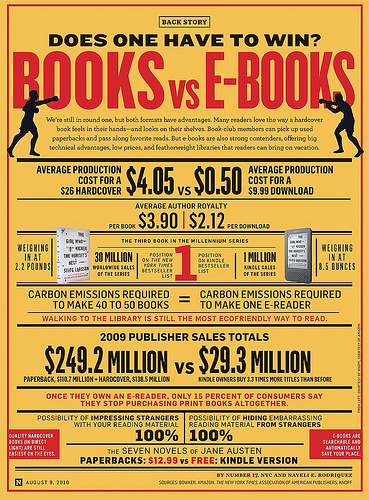
Have you heard? Ebooks are taking over the world! Print books will cease to exist in only a matter of a few short years!
The electronic book has changed the landscape for publishing and consuming books. But is the print book really going to go extinct?
Not in my lifetime.
And here’s why.
Imagine a horizontal line. The line represents value – the left side is lowest value and the right side is highest value to the reader.
Now, the next thing I want you to do is to start picturing different types of content and where they fall along this line that represents value to the reader.
On the far left I would put articles and blog posts. Not that these are totally invaluable, but they just have the least value to the reader. They are designed to be short(er). I would also put newspapers nearby on the line.
Now a little further to the right – toward the middle of this imaginary line – go magazines. Now, a magazine is just a collection of articles, right? True. But they tend to be a collection of articles around a subject. So you can learn more about a subject from a magazine than from an article. Again, I know there are exceptions to this, but just bear with me.
Without moving any further to the right, I would slot the ebook. Ebooks may be extremely informative. You may know of ebooks that have 1,000 or more pages. They are truly comprehensive.
But on my value line, they are no more valuable than magazines. More on why later.
Now move over to the right – almost to the end of the line – and put paperback and hardback books. You could group audio and video files here too. Again, there are exceptions.
Now, why are ebooks slotted in the middle on our imaginary value line?
Here’s why: I put ebooks with magazines because most magazines tend to be read once and then thrown out. The same goes for ebooks. How many books do you have on your “bookshelf” on your Kindle / Ipad? A lot if you’re like me.
But they are collecting virtual dust. I don’t go back to them.
And generally, if I find an ebook I really like, then I go buy the print version so that I can have it for reference.
So the value to me has a lot to do with the content of course. But it also has to do with how I can use the book later. Where I can find it. The fact that I can use a print book and not be sitting in front of my computer or on my iPad is important to me.
At night, I like to read, but I don’t like to read from a computer screen. They’re too bright for right before bed. I want to read a print book.
Now, if you’re with me so far, you can also start to make sense out of how these various pieces of content are priced. As an author, how much you make from your content goes across the very same value line. You can’t expect to make much, if anything, from an article or blog post. But you can expect to make a great deal from a hardcover book sale.
And pricing is the same. Articles / blog posts are generally free to read. Magazines and ebooks cost something, but it is relatively trivial. And then print books cost the most. They have the most value.
Finally, what about the authors of all this content?
The perceived “value” – or maybe expert status is a better way to describe it – works along the very same value line, doesn’t it? An article writer probably has less notoriety than a print book author. So your perceived value works along the same value line. Which means it is a good idea to publish your books in print.
So is the print book going away?
Absolutely not. Smart publishers and authors see the value in print books. The ebook is clearly a ground-breaking invention that will continue to shape the book world. But the ebook will struggle to every have a higher value than the print book to readers. It’s as much a psychological value as it is a practical value.
As an author, you should absolutely continue publishing print books. Not only because you make more money per book but also because you gain a higher perceived value as an author.
Photo credit: elmorsa on Flickr
